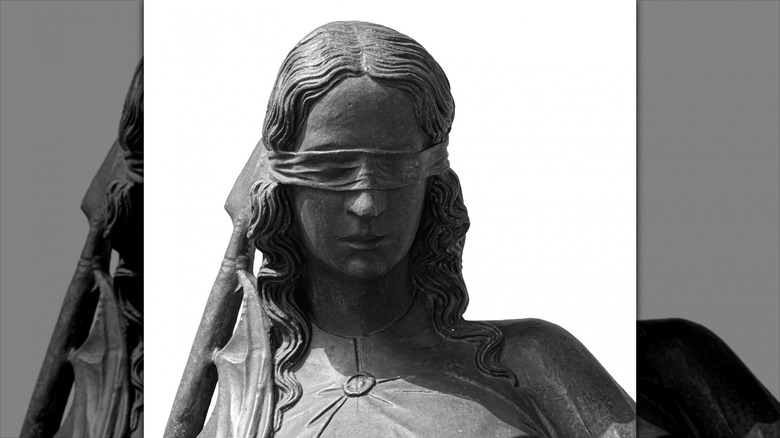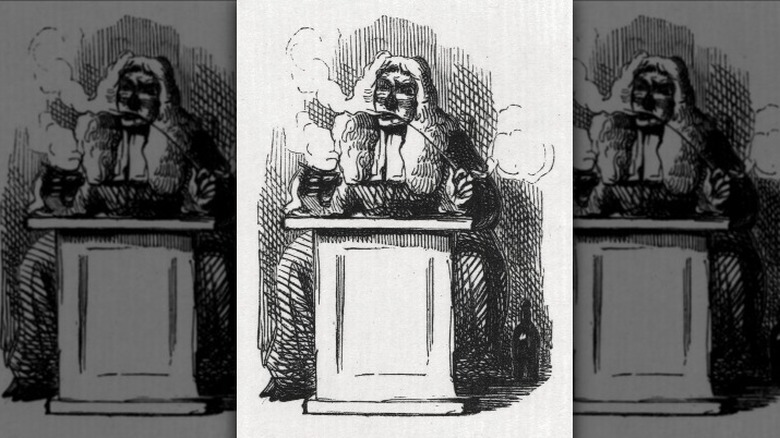Requirements To Be A Supreme Court Justice Are Surprisingly Low
It is the most extraordinarily powerful office in the land — perhaps even moreso than the presidency. Unlike U.S. presidents or members of Congress, Supreme Court justices serve lifelong terms, enabling them to craft the policy landscape for an entire generation. The Supreme Court alone has the power to interpret the United States Constitution, the very document that decides what the United States looks like, thereby writing that history in real time (via Britannica). Surely these most elevated powers and privileges, the singular ability to strip or reinforce 300 million people's rights, would only be afforded to the most impartial, most upstanding, most experienced, most sound minds.
Not exactly. The requirements to be a Supreme Court justice are surprisingly low. As a matter of fact, almost anyone could do it. Although there are no constitutionally-mandated requirements a nominee must fulfill to become a Supreme Court Justice, there are standards of precedent (via Supreme Court) — for example, all justices so far have had legal backgrounds, and reality TV stars aren't usually sworn in — but as we've seen in this weird world, anything could happen.
The list of criteria is pretty slim
While all Supreme Court justices yet appointed have had backgrounds in law, there is no constitutional requirement that justices must have presided over a courtroom. In fact, there is no constitutional requirement that they have presided over (or had training in) anything at all. The Constitution does specify requirements for another office, the presidency – however scant those requirements may be — but no such specifications were laid out for who may and who may not hold a seat on the Supreme Court.
Sound doubtful? Take it from the Supreme Court's own website: "The Constitution does not specify qualifications for Justices such as age, education, profession, or native-born citizenship. A Justice does not have to be a lawyer or a law school graduate, but all Justices have been trained in the law."
Former Supreme Court justice and autodidact James F. Byrne's only credential was passing the bar exam — but he not only did he not have a law degree, he'd never even graduated high school.
An Extraordinarily Low Baseline: Supreme Court Justices Cannot Have Committed Treason
In the absence of qualifications required to get the job, there are (a scant few) ways you can lose it. In brief: Do not literally commit treason, and don't get impeached — otherwise, you're set for life. Here's what the Constitution says (and almost all the Constitution says) about how to lose your cushy gig on the Supreme Court in Article III, Section I (via National Constitution Center): "The Judges, both of the supreme and inferior Courts, shall hold their Offices during good Behaviour...." "During good Behaviour," according to the prevailing legal interpretation, is a phrase originating in English Common Law indicating Supreme Court justices can serve for life (via Constitution Annotated) unless otherwise impeached or removed. Judges can be impeached by Congress like anyone else (via CNN) for treason, high crimes and misdemeanors, or bribery, but pretty much only for those things.
While the U.S. Court System has outlined a Code of Conduct for judges (i.e. don't dabble in politics, don't freelance on the side, and don't be "unfair"), this code does not apply to the Supreme Court, which has no such code of its own (as The Atlantic explained). There's no indication from either the Constitution nor the Court itself that judges must have been upstanding individuals prior to taking up a seat on the bench, nor that they must behave like one upon getting there.


